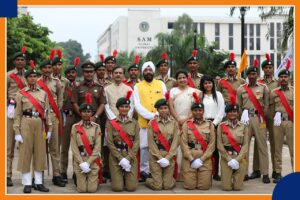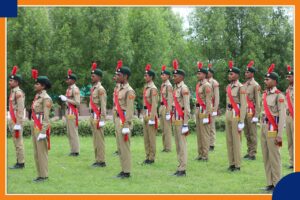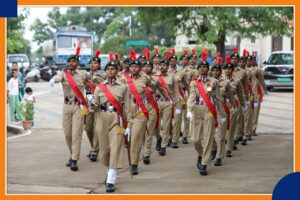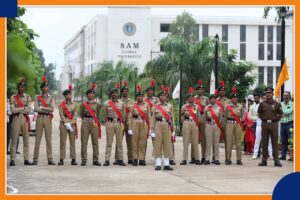National Cadet Corps (NCC)
November 13, 2024 2024-11-27 9:16National Cadet Corps (NCC)
SAM Global University Unit of NCC have been started with the objective to meet the requirements expected the current socio–economic scenario of the country. The NCC aims at developing character, comradeship, discipline, a secular outlook, the spirit of adventure and ideals of selfless service amongst young citizens. Further, it aims at creating a pool of organized, trained and motivated youth with leadership qualities in all walks of life, who will serve the Nation regardless of which career they choose. Needless to say, the NCC also provides an environment conducive to motivating young Indians to join the armed forces.
LT. VISHNU JAVRIYA, ANO
NCC
At Sam Global University, education transcends the traditional classroom setting. We believe in nurturing well-rounded individuals through a holistic approach that combines academic excellence with experiential learning.
The National Cadet Corps (NCC) in India is a voluntary organization which recruits cadets from high schools, colleges and Universities all over India. The Cadets are given basic military training in small arms and parades. The 1 Platoon of 54 cadets under the 1 MPCTR NCC Bhopal unit were raised in Sam Global University were raised.
The NCC in India was formed with the National Cadet Corps Act of 1948. It was raised on 15 July 1948 The National Cadet Corps can be considered as a successor of the University Officers Training Corps (UOTC) which was established by the British in 1942. During World War II, the UOTC never came up to the expectations set by the British. This led to the idea that some better schemes should be formed, which could train more young men in a better way, even during peace times.
Sam Global University Bhopal
A committee headed by Pandit H.N. Kunzru recommended a cadet organization to be established in schools and colleges at a national level. The National Cadet Corps Act was accepted by the Governor General and on 15 July 1948 the National Cadet Corps came into existence.
Campus:-
Centrally Organized Camps
Leadership Camp
Vayu Sainik Camp
Nau Sainik Camp
Rock Climbing Camp
Trekking camp
National Integration Camp (NIC)
NCC at Oriental
Thal Sainik Camp (TSC)
Army Attachment Camp (AAC)
Airforce Attachment Camp (AAC)
Republic Day Camp (RDC)
Combined Annual Training Camp(CATC)
Training
Drill, shooting, Physical fitness, map reading, First aid, Gliding/Flying, boat pulling, sailing and camp training covering basic of military training in Army, Navy and Air Force.
This training is mostly carried out in schools and colleges by the cadets. In addition, depending upon the type of service, basic knowledge of that service is imparted to the cadets e.g gliding , powered flying for Air Wing cadets and boat pulling, sailing for Naval Wing cadets form part of institutional training. These activities comprise approximately 50% of the entire syllabus.
This is the most imp aspect of NCC Training and hence great emphasis on institutional training to be given. State DDG’s to issue comprehensive instructions on organising the Institutional Training at Group / Unit level.
Following actions will be taken to improve the standard of Training:
Optimum utilization of PI Staff for Training.
Greater involvement of Offrs, WTLO’s and ANO’s.
Deficiencies in Training aids will be made up expeditiously.
Basic Training
Drill
Cadets must be made to understand the aim and purpose of teaching drill, so that they are suitably motivated and do not take it as “fatigue”. Emphasis will be laid on correct bearing, marching, saluting and arms drill. Inter-squad competitions may be organized to create interest.
Weapon Training
Cadets generally take keen interest in Training and firing. Units must liaise with nearby Service and Para-Military Units to ensure that all cadets get an opportunity to fire their authorized ammunition. Use of firing simulators may be made to optimize Training efforts where possible.
Youth Exchange Programme
This is a very important activity & is done to increase international understanding and bolster awareness. These exchanges are done with NCC community of 10 countries namely Australia, Bangladesh, Bhutan, Canada, Maldives, Nepal, Singapore, UK, Russia and Vietnam at international level.
Checks
All OC Units are keeping a check of Institutional Training regularly to ensure proper attendance. Attendance registers are marked before the commencement of the parade. All DDG’s are putting an effective monitoring mechanism which is in place to check attendance and conduct of this Training.
Adventure Training
Adventure activities have been incorporated in NCC training with the aim of inculcating and strengthening leadership traits amongst the cadets.
These activities in NCC can be broadly divided into the following:
Land based – Mountaineering, Rock Climbing, Trekking
Water based – Sailing Expedition, White Water Rafting, Scuba Diving, River Crossing
Air based – Para sailing
Other Activities
NCC has adopted community development activities with the aim of imbibing amongst cadets selfless service to the community, dignity of labour importance of self help, need to protect the environment and to assist weaker sections of the society in their upliftment. This is envisaged through programmes involving:
NCC at Sam
Adult-education
Tree plantation
Blood donation
Anti Dowry Rally
Anti Female Infanticide Pledge
Anti Leposy Drive
AIDS Awareness Rally







